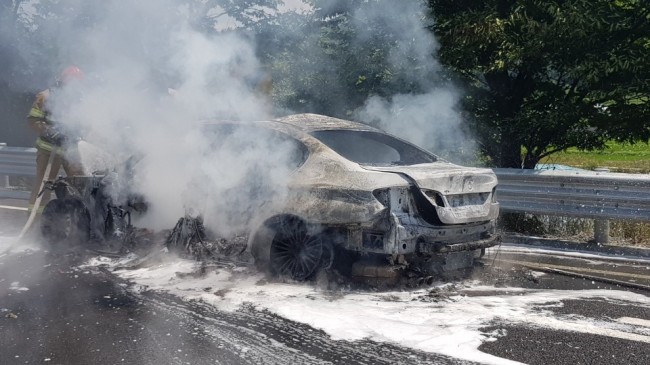In light of the recent BMW incident in which vehicles caught fire presumably over a malfunctioning component, Korea’s auto industry is paying close attention to the amended automobile management act, also referred to as the Korean version of the US lemon law, slated to take effect next January.
The law is being met with mixed reactions. Some critics view it as insufficient and say it should be complemented with stronger legal bounds, while others welcome it as the first step to strengthening consumer rights.
 |
(Yonhap) |
The Ministry of Land, Infrastructure and Transport on Tuesday introduced the new enforcement ordinances for the automobile management act that was revised last year, under which vehicles that experience two “major” defects or three “general” defects within the first year of purchase can receive a refund or exchange.
A deliberative committee consisting of less than 50 professionals under the Korea Transport Safety Authority would decide whether the vehicle is eligible for refund or exchange, and its decision would have the same legal effect as court rulings.
Under the new rules, major defects would be problems found in the following: motor, driveline, steering system, brakes, traveling mechanism, fuel system, electric apparatus and the car body, among others.
In case of a refund, the distance traveled will be marked off the car price, and carmakers will have to pay back the amount owners paid for the acquisition tax and number plate.
The new rule also places the responsibility of defining fault within the vehicle with the manufacturer, stating that errors found within six months of the car having been delivered are presumed to have existed from the moment it was delivered.
The law is benchmarked on the US lemon law, or the Magnuson-Moss Warranty Act that was enacted in 1975 to protect consumer rights in seeking reimbursement for consumer goods that continually fail to meet quality standards.
“Given that it had been difficult for drivers to receive compensation for faulty vehicles, Korea’s lemon law is the first step to improving consumers’ rights,” said Ha Sung-yong, a professor of the department of mechanical and automotive engineering at Shinhan Univeristy.
Given that most cars are driven on average about 150,000 kilometers, the distance driven will be converted into monetary worth and subtracted from the purchasing price of the new vehicle.
For example, 3 million won will be marked off a 30 million won car with a driving distance of 15,000 kilometers, as 10 percent of the car has been used.
Drivers are eligible for a refund if their cars, finalized for exchange, are no longer produced. It is also mandatory for carmakers to include refund and exchange policies in the contract.
But the Korean version, according to critics, has stricter and more complicated requirements for a refund and true compensation is only viable through punitive measures.
“Long story short, South Korea needs to adopt punitive damages, class action, and discovery systems. The purposed lemon law isn’t effective enough to protect and compensate consumers in cases like the recent BMW engine fires and 2016 Volkswagen emissions scandal,” said Park Sang-in, a professor at the graduate school of Seoul National University.
“If we think about it, faulty parts found within three years of buying a new car are mostly covered by the warranty program.”
Yoon Ceol-han, director of the citizens’ rights center and action for consumer justice at leading local civic group Citizens’ Coalition for Economic Justice, pointed out that the rule that requires at least two incidents of defects involving critical devices that are directly linked to drivers’ safety, such as the steering wheel or brakes, was not realistic.
The new ordinances will be finalized after discussion among related ministries and the review of the Ministry of Government Legislation, to be officially implemented as of Jan. 1 next year.
The rules are not applicable to vehicles operated for commercial use, such as buses, taxis or rental cars.
“The ministry is putting together details on guidelines for the deliberative committee along with requirements for reimbursements,” said Jung Song-yi, deputy director of the ministry’s motor vehicles policy division.
Jung added that it would be difficult for related parties to refuse settlement by the deliberative committee, as it would have the same legal effect as court rulings.
By Kim Bo-gyung
(
lisakim425@heraldcorp.com)








